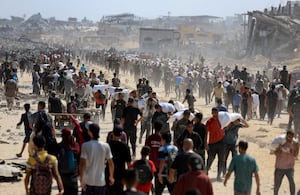Hamas is considering giving Israel and Gaza ceasefire mediators until the end of the week to reach a deal that would end the war or it will withdraw from the current talks in Doha and only return if proposals for a comprehensive deal are on the table, sources told The National on Sunday.
The latest round of Gaza talks mediated by the US, Qatar and Egypt began on July 6. Significant progress has since been made on some issues but Israel and Hamas remain at odds over several key questions.
If the ultimatum is handed, Hamas will only return to the negotiating table to discuss the terms and details of a comprehensive agreement that ends the war in Gaza and ensures an Israeli withdrawal from the coastal enclave, the sources said.
“The ultimatum, if given, will be a message to the United States and the families of the hostages held by Hamas to exert pressure on Israel to accept a deal,” said one of the sources.
“The idea comes from commanders of Hamas's military wing who are bearing witness to the humanitarian tragedy and Israel's moves on the ground while frustrated at the slow pace of progress in Doha.”
Such an agreement will also provide for the exit of wounded Palestinians to receive medical treatment abroad and the return to the enclave of those whose treatment has been completed.
It also envisages the unfettered flow of humanitarian aid into Gaza and the running of the territory's affairs by a panel of independent Palestinian experts once a ceasefire goes into effect.

The Doha talks are taking place amid a worsening humanitarian crisis in Gaza, with hundreds of thousands now facing hunger and acute shortages of essential life items.
The sticking points include the Israeli army's withdrawal from Gaza, the distribution of humanitarian aid and the inclusion of some high-profile Palestinians among the hundreds to be freed from Israeli prisons in return for the release of hostages held by Hamas.
The Israeli army is also suspected of killing hundreds of Palestinians while collecting aid from the Gaza Humanitarian Foundation, a US and Israeli-backed group that bypassed the UN's distribution network. Israel alleges the UN system has allowed Hamas-led militants loot aid shipments intended for civilians. Hamas denies the charge.

There was no immediate confirmation from Hamas on the plan reported by the sources, but both the militant group and Israel have accused each other of preventing a deal from being reached by not compromising on their conditions.
The latest Hamas position would not mark the first time a temporary truce and a limited hostages-for-prisoners swap is put aside, with the group instead focusing on negotiating a wider and enduring settlement.
The move is rooted in its fear that the Israeli army will resume military operations when the proposed 60-day truce expires or when all the hostages are freed.
Hamas is believed to be holding 50 hostages, of whom 20 are still alive.
Israel, for its part, has been generally reluctant to publicly discuss what comes after the proposed truce ends, insisting the war will only end when Hamas's governing and military capabilities are completely dismantled and its leaders leave Gaza to live in exile.

The sources said the decision to give Israel and the mediators an ultimatum also reflected what Hamas saw as time-wasting tactics by Israel in the Doha talks while it proceeds with plans to keep its military indefinitely in Gaza, carving out security zones inside the tiny enclave and pushing hundreds of thousands into designated areas for food distribution from which they cannot leave.
In its latest move, the Israeli army published new eviction warnings for areas of central Gaza on Sunday, for the first time.
When implemented, the evacuation will cut access between the city of Deir Al Balah and the southern cities of Rafah and Khan Younis. Moreover, the area under the order is also home to many international organisations attempting to distribute aid.
The Gaza war began when Hamas-led militants attacked southern Israel on October 7, 2023, killing about 1,200 people, mostly civilians, and taking another 250 hostages back to Gaza.
Israel's response to the attack has since killed more than 58,000 Palestinians, most of them civilians, according to health officials, displaced almost the entire 2.3 million population, plunged the enclave into a humanitarian crisis and left much of the territory in ruins.



